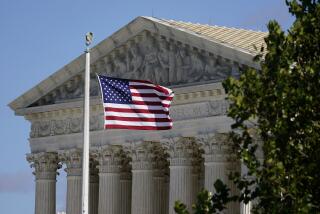Punitive Damages Subject to Income Tax
- Share via
WASHINGTON — The Supreme Court ruled Tuesday that punitive damages awarded in personal injury cases are subject to federal income tax. The decision resolves a split among lower court rulings over this lucrative area of tort litigation.
In a 6-3 vote, the court rejected arguments from the family of a woman who died of toxic shock syndrome in 1983. The family brought a product liability lawsuit against a tampon manufacturer, and a jury awarded the husband and two children of Betty O’Gilvie $1.5 million in actual damages and $10 million in punitive damages. The family paid income tax on the punitive damages proceeds but sought a refund.
The tax law in effect when the family received the award in 1988 excluded from “gross income” the “amount of any damages received . . . on account of personal injuries or sickness.” The O’Gilvies asserted that the provision exempted punitive damages received by a winning plaintiff in a lawsuit for personal injuries.
By making punitive damages subject to income tax, the high court ruling could boost damage awards in some cases, as lawyers press juries to increase damage payments to make up for the amount lost in federal taxes.
“Punitive damages are not covered [by the tax exemption] because they are an element of damages not designed to compensate . . . victims; rather, they are punitive in nature,” Justice Stephen G. Breyer wrote for the majority. “They do not compensate for any kind of loss.”
Three dissenting justices said the majority didn’t interpret the federal tax exemption broadly enough. Punitive damages are only awarded because someone has been injured, the dissenters said, and consequently should receive the same tax-free treatment as so-called “compensatory” damages, which make up for direct loss.
“It seems to me that the personal injury is as [much] a cause of the punitive damages as it is of the compensatory damages,” Justice Antonin Scalia wrote in dissent. “In both cases it is the reason the damages are awarded. That is why punitive damages are called damages.”
Chief Justice William Rehnquist and Justices John Paul Stevens, Anthony Kennedy, David Souter and Ruth Bader Ginsburg joined Breyer’s majority opinion. Scalia’s dissent was supported by Justices Sandra Day O’Connor and Clarence Thomas.
In August, Congress amended tax law to explicitly exempt most punitive damages from the no-tax provision and require them to be taxed beginning in tax year 1997. But the case of O’Gilvie vs. United States had been closely watched because of numerous pending challenges to taxes on jury awards of punitive damages.
Dissenting Tuesday, Justice Antonin Scalia wrote that the majority “greatly understates the connection between an award of punitive damages and the personal injury complained of. . . . It seems to me that the personal injury is as proximate a cause of the punitive damages as it is of the compensatory damages; in both cases it is the reason the damages are awarded.” He was joined by Justices Sandra Day O’Connor and Clarence Thomas.
The case marked the first time the Supreme Court has directly considered questions about whether punitive damages should be tax-exempt. Last year, in a similar decision, the high court ruled that damage awards in age-discrimination cases were not given because of personal injury, and therefore were subject to taxation.
More to Read
Get the L.A. Times Politics newsletter
Deeply reported insights into legislation, politics and policy from Sacramento, Washington and beyond. In your inbox twice per week.
You may occasionally receive promotional content from the Los Angeles Times.










